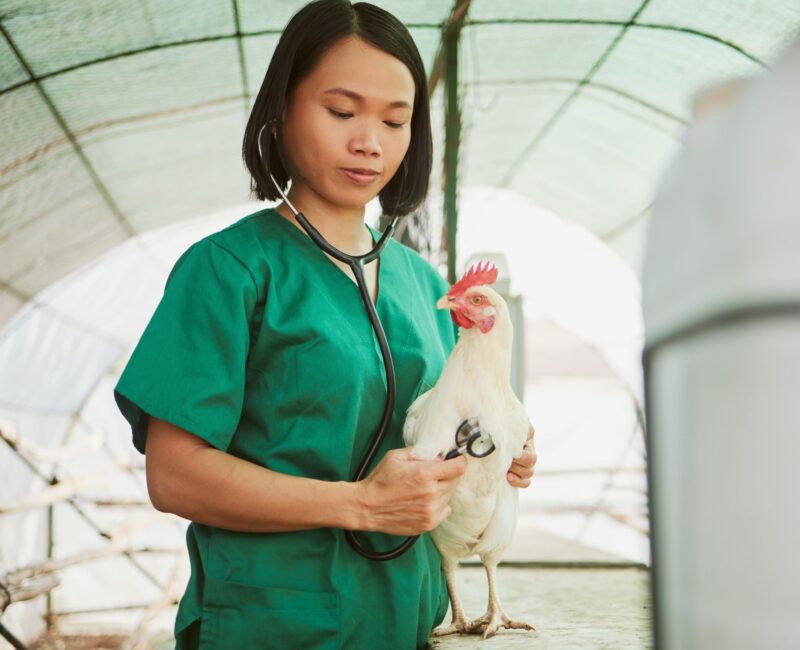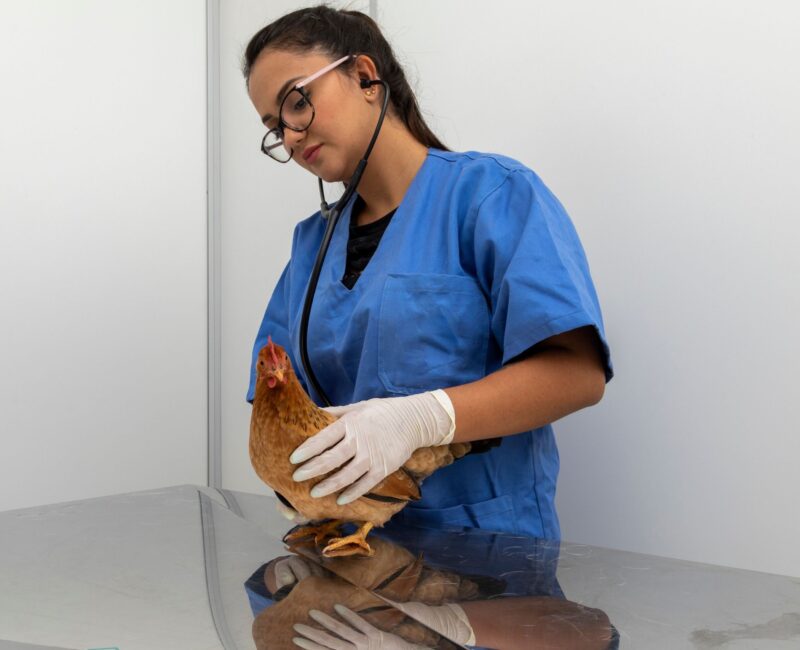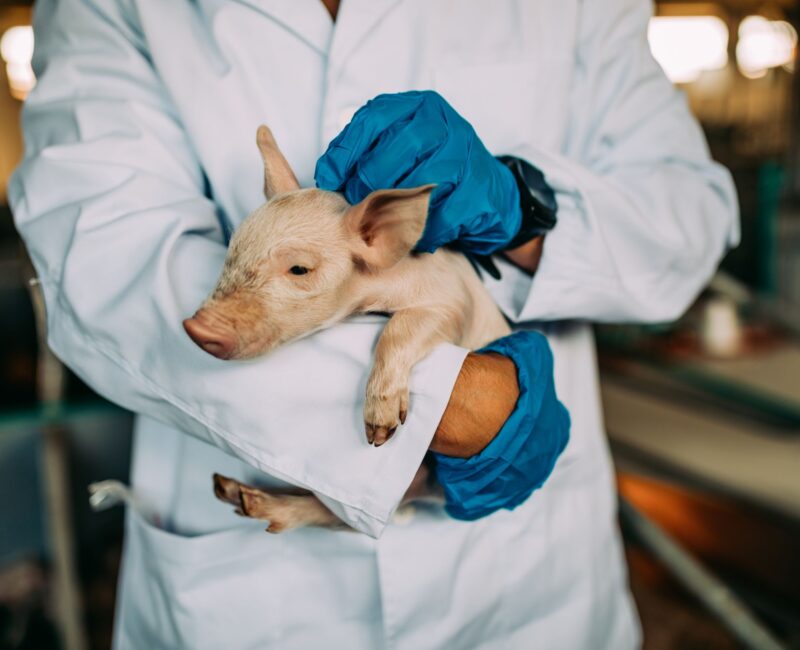Staphylococcus: A Pervasive Threat in Veterinary Medicine
Staphylococcus infections pose a significant challenge in veterinary settings, impacting both animal health and the industry. These normally harmless bacteria can become opportunistic pathogens when host defenses are compromised, causing a range of infections from superficial skin conditions to life-threatening systemic diseases.
In dogs, Staphylococcus often manifests as pyoderma, which can become chronic or recurrent. This persistence necessitates prolonged treatments, straining both animal well-being and owner resources. The bacteria’s ability to spread systemically can lead to severe conditions such as septicemia, endocarditis, or osteomyelitis, requiring intensive medical intervention.
The impact extends beyond companion animals to livestock. In dairy cattle, Staphylococcus-induced mastitis can significantly reduce milk production and quality, affecting farm productivity and economic viability.
Veterinary practices face substantial economic and operational challenges in managing these infections. Treatment costs escalate due to extended antibiotic courses, specialized diagnostics, and potential hospitalizations. Clinics must allocate significant resources to combat these infections effectively, often straining their capacity to address other medical needs.
A growing concern is the rising prevalence of antibiotic-resistant strains, such as Methicillin-resistant Staphylococcus pseudintermedius (MRSP). These resistant bacteria necessitate more potent, expensive antibiotics and demand rigorous infection control measures.
Moreover, the zoonotic potential of certain Staphylococcus species adds a public health dimension to this veterinary challenge. As these bacteria continue to evolve, their impact on animal welfare, veterinary practices, and public health grows increasingly complex, necessitating innovative approaches for effective management.
Common Symptoms of Staphylococcus Infections in Animals:
- Skin inflammation (dermatitis) with redness, swelling, and warmth in affected areas
- Pustules and crusted lesions that may rupture and form scabs
- Excessive itching and scratching, with animals persistently scratching, licking, or chewing at infected sites
- Hair loss (alopecia), especially patchy fur loss around lesions
- Recurrent or chronic skin infections, often in the same areas
- Ear infections (otitis) causing head shaking, ear scratching, discharge, and redness in the ear canal
- Abscesses, which are localized, painful swellings filled with pus, often resulting from bite wounds
- Pyoderma, a deep skin infection characterized by pimples, crusts, and in severe cases, ulcers
- Systemic symptoms including fever, lethargy, and loss of appetite in severe cases
- Secondary infections such as yeast overgrowth or other bacterial infections due to skin barrier disruption
While these symptoms are common across many species, the presentation may vary. In dairy cattle, for instance, Staphylococcus often causes mastitis, characterized by udder inflammation and changes in milk quality.
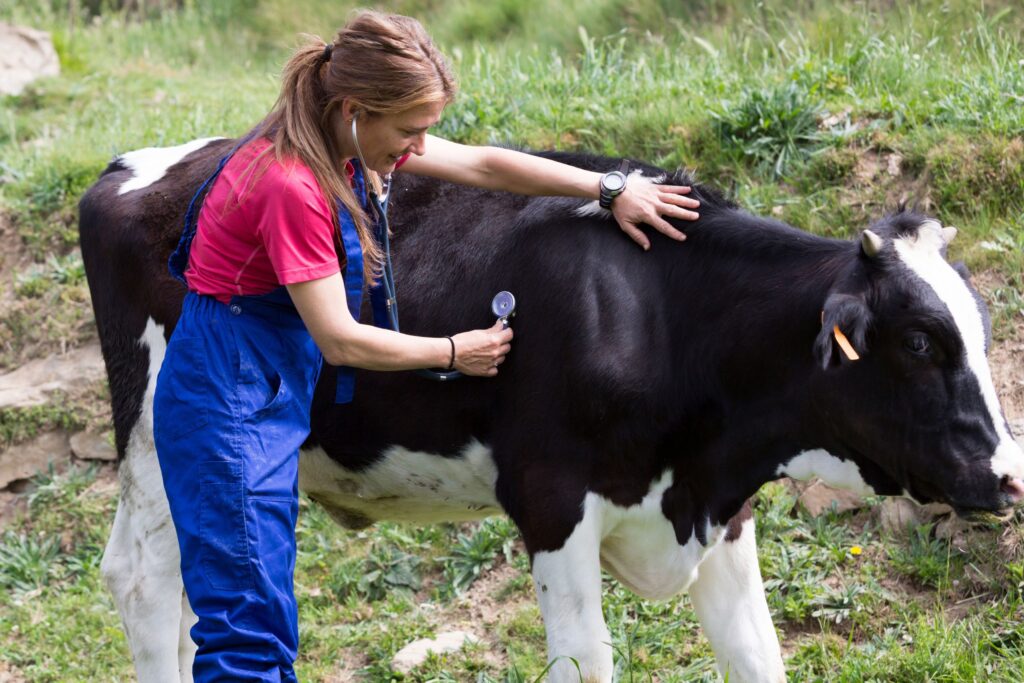

Current Challenges in Treating Staphylococcus Infections
Treating Staphylococcus infections in veterinary medicine has become increasingly challenging due to the rise of antimicrobial resistance. This phenomenon, where bacteria evolve to withstand the effects of antibiotics, has significantly limited the efficacy of conventional treatments. Beta-lactam antibiotics, once the cornerstone of Staphylococcus treatment, are now often ineffective against methicillin-resistant strains like MRSA and MRSP (methicillin-resistant Staphylococcus aureus and pseudintermedius, respectively).
The overuse and misuse of antibiotics in both human and veterinary medicine have accelerated this resistance. In small animal practices, veterinarians face the dilemma of balancing effective treatment with the need to preserve antibiotic efficacy for future use. Large animal veterinarians encounter additional challenges, as the use of certain antibiotics in food-producing animals is restricted due to concerns about residues in the food chain.
Moreover, Staphylococcus bacteria can form biofilms, complex communities that adhere to surfaces and resist antibiotic penetration. This characteristic makes chronic and recurring infections particularly difficult to eradicate, often leading to prolonged treatment courses that further contribute to resistance development.
The limitations extend beyond just antibiotic resistance. Many conventional treatments struggle to address the underlying factors that predispose animals to Staphylococcus infections, such as allergies or compromised immune systems. Additionally, the bacteria’s ability to adapt quickly means that even newly developed treatments may have a limited window of effectiveness.
These challenges underscore the urgent need for innovative approaches in veterinary medicine to combat Staphylococcus infections effectively. As conventional treatments become less reliable, the veterinary community must continue to explore new strategies to manage this persistent threat to animal health.
Address Challenging Staphylococcus Infections with Innovative Phage Therapy. Consult Our Specialists for Tailored Veterinary Solutions.
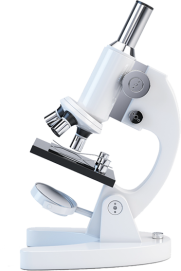

Bacteriophage Therapy: Precision Approach Against Staphylococcus
Qeen Biotechnologies offers bacteriophage therapy as an innovative solution for Staphylococcus infections. This approach uses naturally occurring viruses that specifically target and eliminate Staphylococcus bacteria. Our bacteriophage solutions are designed to attack specific Staphylococcus strains, including those resistant to antibiotics, while preserving beneficial bacteria.
Our bacteriophage therapy addresses key challenges in treating Staphylococcus infections. It effectively combats antibiotic-resistant strains and can penetrate biofilms that often protect bacteria from traditional treatments. The self-replicating nature of bacteriophages allows them to adapt to bacterial evolution, making them particularly effective against chronic and recurring infections.
Safety is a core feature of our approach. We carefully select and test our bacteriophages to ensure they target only the problematic bacteria, reducing the risk of side effects often associated with broad-spectrum antibiotics. This targeted action also helps preserve the animal’s beneficial microbiota.
Qeen Biotechnologies’ bacteriophage therapy provides veterinarians with a precise and adaptable tool for managing Staphylococcus infections. Our solution offers an effective alternative where traditional treatments may fall short, giving new hope in the ongoing battle against these persistent infections.
How It Works
Qeen Biotechnologies’ veterinary bacteriophage therapy employs a natural process called “lysis” to destroy Staphylococcus bacteria. This process involves bacteriophages infecting the host Staphylococcus and converting it into a virus-producing factory, ultimately leading to the bacterium’s destruction.
Infection
Replication
Lysis
The self-replicating nature of bacteriophages allows our therapy to provide sustained protection against Staphylococcus infections, as the phage population continues to expand in the presence of the target bacteria. This unique mode of action ensures long-lasting efficacy and reduces the need for frequent reapplication, which is particularly beneficial in treating chronic Staphylococcus infections in animals.
By harnessing the power of bacteriophage therapy, Qeen Biotechnologies offers a groundbreaking solution for Staphylococcus management in veterinary medicine that is both highly effective and minimally disruptive to the animal’s microbiome. Our commitment to innovation and scientific excellence ensures that veterinarians have access to the most advanced tools in the fight against this persistent pathogen, improving animal health outcomes across various species.
Qeen Biotechnologies
Benefits of Bacteriophage Therapy in Veterinary Medicine
Bacteriophage therapy offers numerous advantages for treating bacterial infections in animals, with specific benefits for Staphylococcus infections:
Unlike broad-spectrum antibiotics, bacteriophages are highly specific to their bacterial targets. This precision targeting means:
- Selective elimination of harmful Pseudomonas bacteria, preserving beneficial microbes
- Minimized disruption to the body’s natural microbiome
- Reduced risk of opportunistic infections, such as Candida albicans overgrowth
Bacteriophages provide precision in bacterial control:
- Specifically targets Staphylococcus strains, leaving beneficial bacteria unharmed
- Effective against various Staphylococcus species found in different animal hosts
- Reduces risk of dysbiosis often associated with broad-spectrum antibiotics
This therapy addresses the growing concern of antibiotic resistance:
- Effective against antibiotic-resistant Staphylococcus strains
- Reduces reliance on critical antibiotics in veterinary medicine
- Helps preserve antibiotic efficacy for both animal and human health
Bacteriophage therapy adapts to diverse veterinary needs:
- Applicable in companion animals, livestock, and exotic species
- Can be tailored for species-specific Staphylococcus infections
- Adaptable to various clinical presentations, from skin infections to systemic diseases
This approach offers ecological and financial advantages:
- Minimizes release of antibiotics into the environment through animal waste
- Naturally biodegradable, leaving no harmful residues
- Supports sustainable and cost-efficient veterinary practices
- Potential for reduced treatment costs due to targeted therapy
- May decrease economic losses associated with antibiotic resistance
Bacteriophage therapy contributes to safer food production:
- Reduces antibiotic use in food-producing animals
- Helps control Staphylococcus contamination in animal products
- Supports efforts to minimize antibiotic residues in the food chain
Phages can effectively target bacteria in biofilms:
- Addresses chronic Staphylococcus infections often protected by biofilms
- Particularly useful in treating persistent wounds or implant-associated infections
- Enhances treatment efficacy where antibiotics often fail
Bacteriophages can evolve with their bacterial targets:
- Potential for long-term efficacy against evolving Staphylococcus strains
- Reduces the need for constant development of new treatments
- Offers a dynamic approach to bacterial control in veterinary medicine
This innovative approach to treating Staphylococcus infections in veterinary medicine provides a promising alternative to traditional antibiotics, addressing key challenges in animal health while supporting broader public health and environmental goals.
Regulatory Expertise for Bacteriophage Therapy
Qeen Biotechnologies offers comprehensive regulatory support for bacteriophage therapy targeting Staphylococcus infections in veterinary medicine. We navigate the complex regulatory landscape, ensuring compliance with veterinary standards and facilitating a smooth progression from development to clinical application in animal health.
Our regulatory services cover the full spectrum of requirements for Staphylococcus-specific bacteriophage treatments. This includes preparation of CMC (Chemistry, Manufacturing, and Controls) packages tailored to veterinary applications, consultation on INAD (Investigational New Animal Drug) applications, and coordination of electronic Common Technical Documents (eCTD) for compliant submissions to veterinary regulatory authorities.
Our experienced regulatory team guides clients through each stage of the process, from initial documentation to final approval for veterinary use. We oversee crucial elements such as compiling regulatory dossiers, communicating with animal health regulatory bodies, and maintaining Good Manufacturing Practice (GMP) standards for veterinary products. Our services extend to regulatory advice on veterinary clinical trial protocols and support during regulatory inspections of animal health facilities.
By managing these intricate regulatory procedures, we enable our clients to efficiently navigate the approval process for Staphylococcus bacteriophage therapies in veterinary medicine. Our expertise not only ensures regulatory compliance but also accelerates the delivery of these innovative treatments to veterinary patients, maintaining high standards of safety and efficacy in animal care.
Enhancing Food Safety with Bacteriophage Technology
Bacteriophages offer a promising solution for enhancing food safety in animal products affected by Staphylococcus. As a natural and targeted approach, phage technology can be applied at various stages of food production to reduce bacterial contamination. In meat and dairy processing, bacteriophages can be used as a spray or wash treatment to eliminate Staphylococcus on animal carcasses or equipment surfaces. This application helps prevent cross-contamination and reduces the risk of foodborne illness. Unlike traditional antimicrobials, bacteriophages are highly specific, leaving beneficial bacteria intact and maintaining product quality. Qeen Biotechnologies’ expertise in phage characterization and formulation enables the development of effective, custom solutions for the food industry. By integrating bacteriophage technology into food safety protocols, producers can enhance consumer protection while addressing the growing concern of antibiotic resistance in the food chain.
Reducing Antibiotic Use in Veterinary Staphylococcus Treatment
Bacteriophage therapy for Staphylococcus infections offers a powerful alternative to conventional antibiotics in veterinary medicine. By targeting specific Staphylococcus strains, including antibiotic-resistant variants, phages can effectively control infections without the broad-spectrum impact of antibiotics. This precision reduces the need for repeated or prolonged antibiotic courses, particularly in chronic Staphylococcus cases. Phages’ self-replicating nature allows for sustained antimicrobial action with minimal dosing, further decreasing antibiotic reliance. Additionally, the ability of phages to penetrate biofilms, a common challenge in Staphylococcus infections, addresses a key limitation of many antibiotics. As phage therapy becomes more prevalent in veterinary practice, it creates opportunities to reserve critical antibiotics for severe cases, thereby slowing the development of resistance in Staphylococcus populations.
Adapting Phage Therapy to Specific Staphylococcus Challenges
Qeen Biotechnologies excels in developing customized bacteriophage solutions to combat Staphylococcus infections across various veterinary applications. Our process begins with the isolation and characterization of Staphylococcus strains from infected animals, utilizing advanced genomic sequencing and bioinformatic analysis. This allows us to identify the most effective phages against specific Staphylococcus variants, including antibiotic-resistant strains. We then optimize phage cocktails for maximum efficacy, considering factors such as the target animal species, infection site, and unique clinical presentations. Our formulation expertise ensures that the phage therapy remains stable and active in diverse physiological environments, from canine skin infections to bovine mastitis cases. Through rigorous in vitro and in vivo testing, we refine each solution to address the particular challenges of Staphylococcus infections in different veterinary contexts. This meticulous customization process allows us to offer veterinarians highly targeted, species-specific treatments that adapt to the evolving landscape of Staphylococcus infections in animal health.
Connect with Our Experts
Experiencing challenges with bacterial infections? Our team at Qeen Biotechnologies specializes in developing and producing bacteriophage-based therapies across various industries. Contact us to learn how our innovative approaches can address your specific needs.



